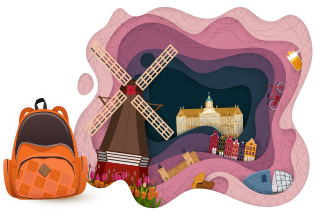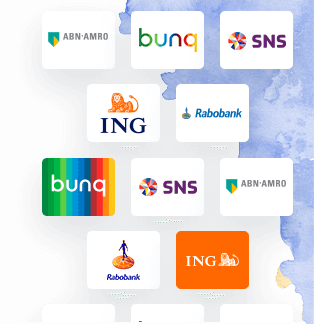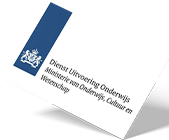The Netherlands is one of the first non-English speaking countries where Universities started teaching in English. It has more than 2.100 English thought courses. The Netherlands is also a very international country, most of its citizens speak English, which makes it really comfortable to live and study for international students.
According to the OECD Better Life Index, the Netherlands is one of the world’s happiest countries, while the 2016 Global Peace index lists it as one of the safest. Thought to be a small country, the Dutch economy is the 18th largest in the world. The Netherlands is considered to be a leader in many areas of expertise, including agriculture, water management, art & design, logistics, sustainable energy, and education.
Both Academic Universities and Universities of Applied Sciences offer opportunities for international students to pursue a bachelor’s degree or master’s programs. The difference is in the orientation, a University of Applied Science is more professional and practical oriented while an Academic University maintains a more academic orientation.
The University fees you have to pay in the Netherlands vary from the institution and from the degree you want to take. However, Dutch students and students from EU/EEA, Switzerland, and Surinam pay a lower fee than students from other countries do. In general, the cost of study in the Netherlands for international students from an EU/EEA country is between €1.040 to €2.083 for a bachelor’s degree and between €1.070 and €2.083 for a master’s degree. If you are from another country than one mentioned above, the tuition fee will cost you €19,400 for a bachelor’s program and €52,000 for a master’s program.
Yes, there are a number of scholarships in the Netherlands for international students, the most popular ones are the Erasmus Mundus Scholarship and the Netherlands Fellowship Program.
The university applications in the Netherlands are submitted via the university’s own websites and Studielink.nl. Each degree and each university have its own application process for international students, so pay close attention and carefully check the list of the required documents. In general, the documents you have to provide are a copy of your passport or ID card, passport photo, a personal statement in English, proof of language proficiency for Dutch or English, depending on whether you apply for bachelor, Masters’ or Ph.D., you will have to provide copies of your secondary school diplomas, grades list, transcription of records with a detailed list of all the university courses and modules and the corresponding grades for each of them.
For English programs, you will need a TOEFL, IELTS, or C1 Advanced certificate. For Dutch programs, you will need a Dutch TUL or Dutch NT2-II certificate. Sometimes you can take a language test at the university to find out if your level is good enough already. These options are not available at every university, so make sure to check it with the institution that you want to apply for.
Yes, you can apply for multiple universities and programs in the Netherlands, however, you have to consider that for every application you have to pay an application fee which is around €100 each time you make a new application. The fee is not reimbursable, it is only deducted from your tuition fee once you get accepted.
If you have your letter of acceptance, you would not have any problems getting your student visa in the Netherlands. The exceptions are only if you were convicted of felonies or have a negative criminal record.
To have a better overview on finding your perfect student home in the Netherlands, follow our guide.
Yes, most of the time the offers presented in the Facebook Housing Groups are reliable. In order to protect yourself from scammers, never make a payment if you are not in the Netherlands and did not see the accommodation, also be aware, when making a transfer, make sure that it is a DUTCH BANK ACCOUNT, if the account is foreign, most probably you are dealing with a scammer.
In order to receive a BSN number, you have to be registered at your Dutch address, if your accommodation does not offer a possibility for registration, we advise you to look for another student accommodation in order to be registered.
Deposit is the guarantee you pay before checking in into your new student home in the Netherlands. It is paid before moving in when you sign the contract. Usually, a deposit is the amount of a month's rent, however, sometimes it may be different. You will get back your deposit when moving out of your student accommodation in the Netherlands.
Yes, it is usual to find new student accommodation in the Netherlands through a housing agency, however, consider that you will have to pay an agency fee, which most of the time constitutes a monthly rent.
In the Netherlands, it is common to sub-rent or sub-let student accommodation. Before sub-renting make sure the landlord is informed, and the registration is possible. If you ignore these steps, you may face some disputes, which can result in a big fine and your immediate expulsion from the accommodation.
To find out if you meet all the requirements for receiving housing allowance in the Netherlands as an international student, please follow our Huurtoeslag guide.
Whether you need a work permit (TWV) in order to have a student part-time work depends on your nationality. If you are a student from Switzerland or the EU/EEA (except for Croatia), you do not need a work permit and have no restriction on the number of hours that you are allowed to work. If you are a student from any other country, you will need a work permit.
To get a work permit, you need to be employed by a company that is recognized by the IND (Immigration and Naturalization Service of the Netherlands). This company will then apply for a working permit for you, so you cannot do this yourself.
Yes, but it’s recommended you limit your working hours to 10 a week and do full-time employment only during the summer months of June, July, and August.
A "zoekjaar" is a period that you are granted after completing your studies to look for work in the Netherlands or explore other educational opportunities. You need to apply for this yourself and it costs €285. You can only apply for the zoekjaar once per study or research project, so if you do multiple ones, you can apply for a zoekjaar every time you finish one. Keep in mind that you must apply for a zoekjaar within three years of getting your degree as an international student in the Netherlands.
It really depends on the position you are applying for, the job location, and who the employer is. For example, if you want to get a student part-time job in Amsterdam or The Hague in the Horeca industry, you have the chance to get the job even if you don’t speak Dutch. This is because of the big number of tourists and internationals that are in those cities. Moreover, if you apply for a position that works with international clients, then English will be the priority. However, if you're applying for a job focused on locals in a smaller town, (some) understanding of Dutch might be a prerequisite.
Yes, your CV is valuable and important because it usually comrpises your first direct communication with a potential employer. Therefore, a good CV is key when it comes to job applications as a student in the Netherlands.
Everyone who is a Dutch resident or an ex-pat working in the Netherlands is legally obliged to take out standard health insurance (basisverzekering). This means that as a student you don’t have to get this insurance per se, but the moment you start working or get paid for your internship or volunteer work, you are generally obligated to get Dutch health insurance.
Yes, being an international student in the Netherlands, your GP (thuisarts) will always be your initial contact for all medical matters. You should register with a GP upon your arrival in the Netherlands. Your GP will treat basis problems, provide consultations for most of your health questions, and will provide you with all the prescriptions.
Yes, if you are registered with the Dutch GP (thuisarts) and are in possession of a Dutch student health insurance, all of your medical expenses are covered, also the prescribed medications.
If it is outside your GP working hours and you are in need of urgent medical help, please contact the GP post in your region. You can find all the GP post numbers on this page
If you study in the Netherlands, the Dutch government provides a healthcare allowance for everyone up to a certain income. If you have Dutch healthcare insurance and you are over 18 years of age, you can apply for this allowance.
In the Netherlands, most of the international students spend on average between €800 and €1100 a month. This depends on the city and also how you save money as a student. The most expensive cities to live in the Netherlands are Amsterdam, Rotterdam, The Hague, and Eindhoven. Most of the prices are similar the only huge difference is the rent. In big cities, rent is much higher and also there are more transportation costs.
Yes, in order to pay your rent, student health insurance or just to get groceries you will need a Dutch Bank Account.
Opening a student bank account in the Netherlands is easy. Most of the Dutch banks have special student packages, you will need your ID card, BSN number, and an address. However, if for some reason you are not in possession yet of a BSN number, you can get your Dutch bank account here.
In most places in the Netherlands, they don’t accept foreign credit/debit cards. Dutch people primarily use the debit cards issued by Dutch banks which also facilitate online banking and e-commerce via iDeal.
As opposed to credit card payments, iDeal facilitates buying on the Internet via direct online payments from a bank account. With your own Dutch bank account, you will never have a problem paying for your needs in the Netherlands, or receiving your student allowance, loan, grant, or salary.
Yes, in the Netherlands, as a student you are eligible for various allowances such as healthcare allowance, housing allowance (rent contribution provided by the Dutch government), and student loans. If you want to check whether you are eligible for student allowances in the Netherlands, please read our allowance guides.
Yes, at Student-Helpr, we are dedicated to assisting international students in the Netherlands in any aspect of student life. Our tax advisor will look into your taxes and file the tax return very thoughtful.
Student Helpr is a one-stop-shop platform that is your information guide before, during, and after your studies in the Netherlands.
We are located in Leiden, Netherlands, but our advice covers the whole Netherlands.
Yes, our partners are well known and trusted service providers in the Netherlands. We seek to collaborate closely with organizations that have a reputation in assisting international students in the Netherlands and are offering the best services and products.






















